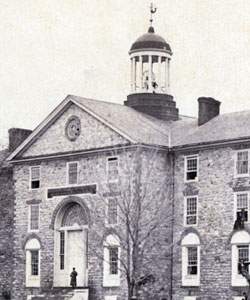George Tankard Garrison (Dickinson Chronicles)
Scholarship
George Tankard Garrison was born the son of James R. Garrison and Susan P. Tankard Garrison in Accomac County on Virginia's "eastern shore" on January 14, 1835. He enrolled at Dickinson College in Carlisle, Pennsylvania with the class of 1854. A popular student, he was a member of the notorious Zeta Psi fraternity forced to disband in 1853. He walked with a limp since childhood and used a cane. He graduated with his class and entered the University of Virginia Law School and graduated there in 1857.
He opened a practice in his home county but on the outbreak of the Civil War enlisted in the Confederate armed forces as a private, despite his disability. His main service to his home state during the war came as a legislator, though, since he was elected to the house of delegates and served there between 1861 and 1863. He then was a member of the state senate from 1863 to the end of the war. Just after the war, from May 1865, he briefly represented Captain Richard B. Winder, accused and imprisoned for war crimes at Andersonville Prison. In the elevated atmosphere following Lincoln's murder and the revelations over the treatment of Union prisoners in Confederate hands, Garrison himself was in fact arrested and imprisoned for a short time as he represented Winder.
Following the war, he resumed his practice in Accomac County and also took up farming. In 1870 he began an eleven year service as an elected judge of the Virginia Eighth Circuit. In 1881 he resigned to seek election to the United States Congress as a Democrat. He served in the 47th U.S. Congress and then, in 1883, he lost a re-election bid by one vote in more than twenty thousand votes cast. He contested this result, won his appeal, and was seated for his second term in the 48th U.S. Congress. Following this service, he returned in 1885 to private practice and later was elected as county judge of Accomac County.
Garrison had married Charlotte Ailworth of Accomac on September 19, 1867 and the couple had one child. George Tankard Garrison died in Accomac on November 14, 1889 and was buried in the Edgehill Cemetery. He was sixty-four years old.
He opened a practice in his home county but on the outbreak of the Civil War enlisted in the Confederate armed forces as a private, despite his disability. His main service to his home state during the war came as a legislator, though, since he was elected to the house of delegates and served there between 1861 and 1863. He then was a member of the state senate from 1863 to the end of the war. Just after the war, from May 1865, he briefly represented Captain Richard B. Winder, accused and imprisoned for war crimes at Andersonville Prison. In the elevated atmosphere following Lincoln's murder and the revelations over the treatment of Union prisoners in Confederate hands, Garrison himself was in fact arrested and imprisoned for a short time as he represented Winder.
Following the war, he resumed his practice in Accomac County and also took up farming. In 1870 he began an eleven year service as an elected judge of the Virginia Eighth Circuit. In 1881 he resigned to seek election to the United States Congress as a Democrat. He served in the 47th U.S. Congress and then, in 1883, he lost a re-election bid by one vote in more than twenty thousand votes cast. He contested this result, won his appeal, and was seated for his second term in the 48th U.S. Congress. Following this service, he returned in 1885 to private practice and later was elected as county judge of Accomac County.
Garrison had married Charlotte Ailworth of Accomac on September 19, 1867 and the couple had one child. George Tankard Garrison died in Accomac on November 14, 1889 and was buried in the Edgehill Cemetery. He was sixty-four years old.
John Osborne and James W. Gerencser, eds., “George Tankard Garrison,” Dickinson Chronicles, http://chronicles.dickinson.edu/encyclo/g/ed_garrisonGT.htm.
George Tankard Garrison (Congressional Biographical Directory)
Reference
GARRISON, George Tankard, a Representative from Virginia; born in Accomack County, Va., January 14, 1835; was graduated from Dickinson College, Carlisle, Pa., in 1853 and from the law department of the University of Virginia, Charlottesville, Va., in 1857; was admitted to the bar and commenced practice in Accomac; served as a private in the Confederate Army during the Civil War; member of the State house of delegates 1861-1863; served in the State senate 1863-1865; resumed the practice of law and also engaged in agricultural pursuits; elected judge of the eighth Virginia circuit in 1870 and subsequently judge of the seventeenth circuit; elected as a Democrat to the Forty-seventh Congress (March 4, 1881-March 3, 1883); successfully contested the election of Robert M. Mayo to the Forty-eighth Congress and served from March 20, 1884, to March 3, 1885; resumed the practice of law; elected judge of the county court of Accomack County, Va.; died at Accomac, Va., November 14, 1889; interment in Edge Hill Cemetery.
“Garrison, George Tankard,” Biographical Directory of the United States Congress, 1774 to Present, http://bioguide.congress.gov/scripts/biodisplay.pl?index=G000084.

